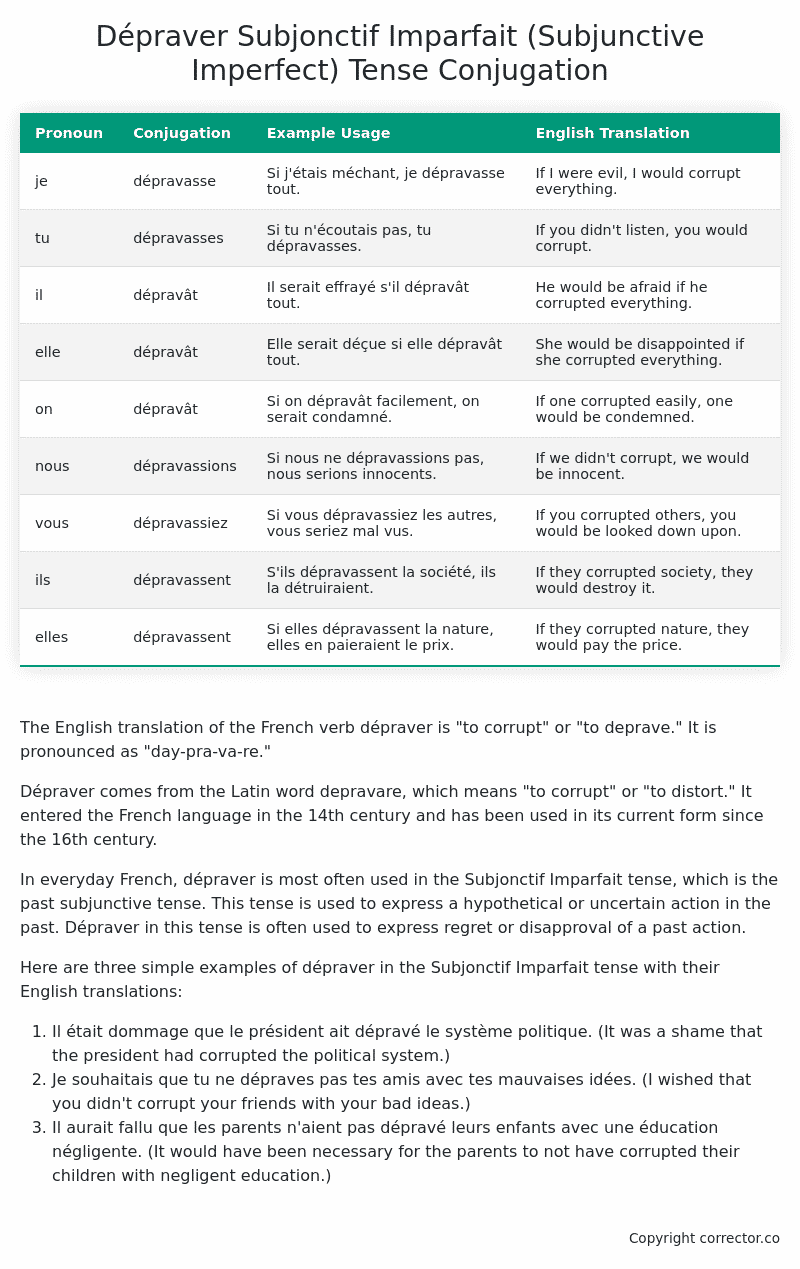Subjonctif Imparfait (Subjunctive Imperfect) Tense Conjugation of the French Verb dépraver
Introduction to the verb dépraver
The English translation of the French verb dépraver is “to corrupt” or “to deprave.” It is pronounced as “day-pra-va-re.”
Dépraver comes from the Latin word depravare, which means “to corrupt” or “to distort.” It entered the French language in the 14th century and has been used in its current form since the 16th century.
In everyday French, dépraver is most often used in the Subjonctif Imparfait tense, which is the past subjunctive tense. This tense is used to express a hypothetical or uncertain action in the past. Dépraver in this tense is often used to express regret or disapproval of a past action.
Here are three simple examples of dépraver in the Subjonctif Imparfait tense with their English translations:
- Il était dommage que le président ait dépravé le système politique. (It was a shame that the president had corrupted the political system.)
- Je souhaitais que tu ne dépraves pas tes amis avec tes mauvaises idées. (I wished that you didn’t corrupt your friends with your bad ideas.)
- Il aurait fallu que les parents n’aient pas dépravé leurs enfants avec une éducation négligente. (It would have been necessary for the parents to not have corrupted their children with negligent education.)
Table of the Subjonctif Imparfait (Subjunctive Imperfect) Tense Conjugation of dépraver
| Pronoun | Conjugation | Example Usage | English Translation |
|---|---|---|---|
| je | dépravasse | Si j’étais méchant, je dépravasse tout. | If I were evil, I would corrupt everything. |
| tu | dépravasses | Si tu n’écoutais pas, tu dépravasses. | If you didn’t listen, you would corrupt. |
| il | dépravât | Il serait effrayé s’il dépravât tout. | He would be afraid if he corrupted everything. |
| elle | dépravât | Elle serait déçue si elle dépravât tout. | She would be disappointed if she corrupted everything. |
| on | dépravât | Si on dépravât facilement, on serait condamné. | If one corrupted easily, one would be condemned. |
| nous | dépravassions | Si nous ne dépravassions pas, nous serions innocents. | If we didn’t corrupt, we would be innocent. |
| vous | dépravassiez | Si vous dépravassiez les autres, vous seriez mal vus. | If you corrupted others, you would be looked down upon. |
| ils | dépravassent | S’ils dépravassent la société, ils la détruiraient. | If they corrupted society, they would destroy it. |
| elles | dépravassent | Si elles dépravassent la nature, elles en paieraient le prix. | If they corrupted nature, they would pay the price. |
Other Conjugations for Dépraver.
Le Present (Present Tense) Conjugation of the French Verb dépraver
Imparfait (Imperfect) Tense Conjugation of the French Verb dépraver
Passé Simple (Simple Past) Tense Conjugation of the French Verb dépraver
Passé Composé (Present Perfect) Tense Conjugation of the French Verb dépraver
Futur Simple (Simple Future) Tense Conjugation of the French Verb dépraver
Futur Proche (Near Future) Tense Conjugation of the French Verb dépraver
Plus-que-parfait (Pluperfect) Tense Conjugation of the French Verb dépraver
Passé Antérieur (Past Anterior) Tense Conjugation of the French Verb dépraver
Futur Antérieur (Future Anterior) Tense Conjugation of the French Verb dépraver
Subjonctif Présent (Subjunctive Present) Tense Conjugation of the French Verb dépraver
Subjonctif Passé (Subjunctive Past) Tense Conjugation of the French Verb dépraver
Subjonctif Imparfait (Subjunctive Imperfect) Tense Conjugation of the French Verb dépraver (this article)
Subjonctif Plus-que-parfait (Subjunctive Pluperfect) Tense Conjugation of the French Verb dépraver
Conditionnel Présent (Conditional Present) Tense Conjugation of the French Verb dépraver
Conditionnel Passé (Conditional Past) Tense Conjugation of the French Verb dépraver
L’impératif Présent (Imperative Present) Tense Conjugation of the French Verb dépraver
L’infinitif Présent (Infinitive Present) Tense Conjugation of the French Verb dépraver
Struggling with French verbs or the language in general? Why not use our free French Grammar Checker – no registration required!
Get a FREE Download Study Sheet of this Conjugation 🔥
Simply right click the image below, click “save image” and get your free reference for the dépraver Subjonctif Imparfait tense conjugation!

Dépraver – About the French Subjonctif Imparfait (Subjunctive Imperfect) Tense
Formation
Common Everyday Usage Patterns
Interactions with Other Tenses
Subjonctif Présent
Indicatif Passé Composé
Conditional
Conditional Perfect
Summary
I hope you enjoyed this article on the verb dépraver. Still in a learning mood? Check out another TOTALLY random French verb conjugation!


